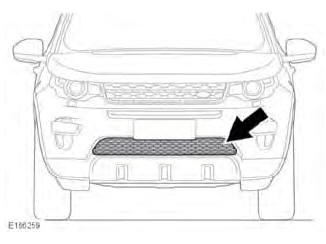Land Rover Discovery: The exterior
Following cleaning of the vehicle's exterior (particularly with a pressure washer), it is recommended that the vehicle is taken for a short drive to dry out the brakes
- To prevent damage to your vehicle when using a valeting service, make sure to advise them of the cleaning instructions contained within the Owner's handbook.
- Remove any heavy deposits of mud and dirt with a hose, before washing the vehicle.
- Some high pressure cleaning systems are sufficiently powerful enough to penetrate suspension joints, door/window seals and damage trim and door locks. Never aim the water jet directly at any cameras, the engine air intakes, heater air intakes, body seals (doors, sunroof, windows etc.), or at any components which may be damaged (lights, mirrors, exterior trim, suspension seals and gaiters, etc.). Make sure the pressure washer nozzle is always at a distance of more than 300 mm (12 ins) from any component of the vehicle.
- When lifting the wiper blades for cleaning, use the Winter park position to avoid damage to the vehicle.
- Do not use a power wash system in the engine bay area.
- Following cleaning of the vehicle's exterior (particularly with a pressure washer), it is recommended that the vehicle is taken for a short drive to dry out the brakes.
- Substances which are corrosive, such as bird droppings, can damage the vehicle's paintwork and should be removed as soon as possible.
- Use only cleaning products approved for use on vehicles.
- Do not apply polish to any unpainted areas of bumper mouldings. It will become ingrained in the textured finish.
SENSORS AND CAMERAS
When washing the vehicle, do not aim high pressure water jets directly at any of the sensors and cameras.
Do not use abrasive materials or hard/sharp objects to clean the sensors and cameras. Only use approved vehicle shampoo.
Park assist and Parking aid sensors should be kept clean to maintain accuracy and performance.
If required, the cameras should be cleaned using a cloth moistened with a small amount of glass-cleaning product.
UNDER BODY MAINTENANCE
Regularly flush the under body with plain, clean water, and pay particular attention to areas where mud and debris collect.
If damage or corrosion are detected, have the vehicle checked by a Retailer/ Authorised Repairer as soon as possible.
ENGINE COMPARTMENT
- Do not use a high pressure washer or steam cleaner in the engine compartment.
- Make sure that the brake fluid
reservoir is kept dry at all times.
Only use a clean, dry cloth to clean the brake fluid cap and reservoir.
AFTER OFF-ROAD DRIVING
Make sure the vehicle's underside is cleaned as soon as possible after driving off-road.

Make sure the areas around air intakes and the front grille are clean and clear of debris. Pay particular attention to the lower grille and radiator. Failure to do so may cause the engine to overheat, leading to severe engine damage.
ALLOY WHEELS
Only use approved wheel cleaning products.
GLASS SURFACES
Clean the rear window with a soft cloth to avoid damaging the heating element. Do not scrape the glass or use any abrasive cleaning fluid.
Mirror glass is particularly susceptible to damage. Wash with soapy water. Do not use abrasive cleaning compounds or metal scrapers to remove ice.
To avoid damaging the protective coating, only clean the interior side of the sunroof glass with a soft cloth. Do not scrape the glass or use abrasive cleaning fluids.
REAR SCREEN
To avoid damaging the heating elements when cleaning the inside of the rear screen, use only a soft, damp cloth or chamois leather. Do not use solvents or sharp objects to clean the glass.

